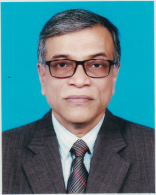| Biography | |
|---|---|
 Prof. Abu Bakar Md. Ismail Dept. of Electrical & Electronic Engineering University of Rajshahi, Rajshahi 6205, Bangladesh |
|
| Title: Photoelectrochemically solar energy harvesting using earth-abundant metal oxides | |
| Abstract: Considering the cost of raw materials, elements with high abundance in the earth's crust are always preferred for inexpensive and scalable solar energy conversion and storage into chemical fuels like Hydrogen (H2). This presentation provides our experience on H2 production by solar water splitting using the earth abundant metal oxides-based photoelectrochemical cells (PEC) fabricated with low-cost spin coating technique. Naturally abundant Hematite (α-Fe2O3) and Cupric Oxide (CuO) have been chosen as photoanode/photocathode in PEC because of their favorable band gap, chemical stability and low cost. Solar water splitting at a bias of ~0.8 V, which was much lower than the required 1.23 V, was achieved when naturally n-type Fe2O3 was used in a heterojunction with p-type porous silicon as photoanode. Band gap engineering of naturally n-type Fe2O3 by codoping it with Zn and Cu in a facile way transformed it to p-type, and when applied as photocathode it produced H2 by solar water splitting. Although low-bias and photocathodic reduction of water was achieved by Fe2O3, the efficiency was low (low photocurrent density). In the quest of finding photoelectrode with high photocurrent density another earth abundant material CuO was investigated. A high photocurrent density of more than 19 mA/cm2 was obtained when CuO was synthesized through a novel chemical route. Our experimental results show that earth abundant metal oxides-based devices fabricated with a simple and low cost spin-coating technique might be a solution to the sustainable harvesting of solar energy. | |
| Biography: Abu Bakar Md. Ismail is a Professor in the Department of Electrical and Electronic Engineering University of Rajshahi, Bangladesh. He earned a Ph.D. from the Saga University, Japan in 1998 where he worked advanced instrumentation. Later he worked for two years as a postdoctoral research assistant in the ISIR, Osaka University as a NEDO researcher. Professor Ismail served as Director of the Institutional Quality Assurance Cell, the Dean of the Faculty of Engineering, the Chairman and the of the department and the Director of the Central Science Laboratory of Rajshahi University. He also served as an Associate Professor in the Electronics Engineering department of Fatih University, Istanbul, Turkey. He continues his research in advanced electronic materials and nanotechnology, in particular the development of novel inorganic and organic semiconductor thin films and nanostructures, with strong emphasis on the development of innovative structures for application in areas such as solar cells, sensors. | |
